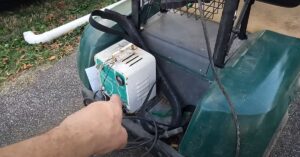Can You Overcharge Golf Cart Batteries?
Ever wondered what might happen if you leave your golf cart battery plugged in for too long? Well, it’s a common question among golf enthusiasts and cart owners alike. Overcharging is a real concern that can lead to various issues.
Yes, indeed! Overcharging golf cart batteries is possible and it can cause significant damage. Prolonged overcharging leads to reduced battery life or even complete failure, causing unnecessary expenses for replacement.
Curious about the signs of an overcharged battery or how to prevent this from happening? Stick around as we dive into these topics and more without getting overly technical. Get ready for some enlightening insights on maintaining your golf cart batteries at their optimal performance level!
Key Takeaways
- Overcharging golf cart batteries can lead to irreversible damage.
- Proper charging techniques are crucial for maximizing battery lifespan.
- Regular monitoring and maintenance prevent overcharging risks.
- Consult the manufacturer’s guidelines to ensure optimal battery performance.
Can overcharging damage golf cart batteries?
Overcharging can indeed damage golf cart batteries. Let’s dig deeper into the reasons why this is the case:
Reduced battery lifespan
Overcharging exposes the battery to excessive heat and can cause irreversible damage to its internal components. This leads to a shorter overall lifespan for the battery, requiring more frequent replacements.
Electrolyte imbalance
Overcharging causes electrolysis within the battery, resulting in an imbalance of chemicals and electrolytes. This can lead to corrosion, reduced capacity, and poor performance over time.
Plate distortion
The continuous flow of excessive current during overcharging can cause distortions in the battery plates, affecting their ability to hold and deliver charge effectively.
Safety hazards
Overcharged batteries are prone to venting hydrogen gas, which is highly flammable and poses a safety risk if ignited.
To avoid damaging your golf cart batteries through overcharging, it is crucial to use a suitable charger with automatic shut-off features or a smart charger that prevents overcharge conditions by monitoring voltage levels accurately. Regularly checking and maintaining proper water levels in flooded lead-acid batteries is also essential for optimal performance and longevity.
What are the potential risks of overcharging golf cart batteries?
Overcharging golf cart batteries can lead to a range of potential risks that every golf cart owner should be aware of. Let’s dig deeper into these risks and understand why they are important.
Reduced Battery Lifespan
One of the main risks of overcharging golf cart batteries is a significantly reduced lifespan. When a battery is constantly subjected to overcharging, it causes excessive heat buildup and accelerates the chemical reactions within the battery. This ultimately leads to premature aging and shorter overall battery life.
Acid Leakage
Another risk associated with overcharging is acid leakage from the battery cells. Excessive charging causes an increase in internal pressure, which can result in cracks or damage to the battery casing. Acid leaks not only damage the surrounding components but also pose safety hazards for anyone who comes into contact with it.
Thermal Runaway
Overcharging increases the temperature inside the battery, which can trigger a dangerous phenomenon known as thermal runaway. This occurs when an increase in temperature causes a self-accelerating reaction within the battery, leading to rapid overheating and potentially causing fires or explosions.
Damage to Electronics
Golf carts have sensitive electronic components that are vulnerable to high voltage levels caused by overcharging. The excess voltage can cause irreversible damage to circuit boards, controllers, and other electrical systems, resulting in costly repairs or replacements.
How to prevent overcharging of golf cart batteries?
Overcharging golf cart batteries is a common issue that can lead to reduced battery life and performance. However, there are several simple steps you can take to prevent overcharging and ensure the longevity of your golf cart batteries.
Use a Smart Charger
One effective way to prevent overcharging is by investing in a smart charger specifically designed for golf cart batteries. These chargers have built-in sensors that automatically adjust the charging process to avoid overcharging.
Set Charging Time Limits
Another method is to set time limits for charging your golf cart batteries. Most modern chargers come with timers or programmable settings that allow you to specify the duration of the charging cycle. Once the set time has elapsed, the charger will automatically shut off, preventing any further charging.
Regularly Monitor Battery Voltage
Keep an eye on your battery’s voltage levels during charging and make sure it doesn’t exceed recommended levels. You can use a voltmeter or a battery monitoring system (BMS) to monitor voltage accurately and prevent overcharging.
Avoid Leaving Batteries on Continuous Charge
It’s important not to leave your golf cart batteries on continuous charge for extended periods when they’re not in use. Over time, this can lead to overcharging and damage the battery cells.
Are there any signs or indicators that a golf cart battery is being overcharged?
Overcharging a golf cart battery can lead to various issues, so it’s essential to be aware of the signs and indicators that indicate overcharging. Let’s explore some common indications that your golf cart battery may be experiencing overcharging.
Battery Temperature
If you notice that the battery is excessively hot to touch after charging, it could be a sign of overcharging. Overcharging causes increased heat production, which can damage the battery cells.
Electrolyte Levels
Check the electrolyte levels in your golf cart battery regularly. If you observe bubbling or boiling during charging, it suggests an excessive flow of current due to overcharging.
Battery Voltage
Monitoring the voltage level is crucial for identifying potential overcharging issues. An abnormally high voltage reading indicates an overloaded or damaged charger, leading to possible overcharge conditions.
Frequent Watering
Overcharged batteries tend to consume water at a faster rate than usual due to increased chemical reactions occurring within them. If you find yourself frequently adding distilled water to maintain proper electrolyte levels, it could indicate an issue with overcharging.
Poor Battery Performance
Lastly, if you notice reduced runtime or diminished overall performance from your golf cart battery despite regular charging cycles, there’s a possibility that it has been subjected to excessive charging currents.
What are the consequences of consistently overcharging golf cart batteries?
Consistently overcharging golf cart batteries can lead to a variety of negative consequences. Let’s dig deeper into the reasons why this is an issue and how it can affect your golf cart.
Reduced Battery Life
Overcharging puts excessive stress on the battery, causing it to deteriorate faster than normal. This means you will have to replace your batteries more frequently, resulting in additional expenses.
Decreased Performance
Over time, overcharged batteries lose their ability to hold a charge efficiently. As a result, you may notice a decrease in power and performance during your golf cart rides.
Safety Risks
Overcharged batteries are prone to overheating and could potentially leak or even explode in extreme cases. This poses serious safety risks not only for you but also for those around you.
Diminished Range
When batteries are consistently overcharged, they may not provide optimal energy storage capacity. Consequently, your golf cart’s range per charge will be reduced, limiting how far you can travel before needing to recharge again.
FAQs
Q: Is it possible to overcharge golf cart batteries?
A: Yes, it is possible to overcharge golf cart batteries. Overcharging can lead to damage or deterioration of the battery’s performance and lifespan.
Q: What are the consequences of overcharging golf cart batteries?
A: Overcharging golf cart batteries can cause electrolyte loss, increased water consumption, and excessive heat generation. This can result in reduced battery capacity, shortened overall lifespan, and potential safety hazards.
Q: How can one prevent overcharging golf cart batteries?
A: To prevent overcharging, it is important to use a charger specifically designed for golf cart batteries that has an automatic shut-off feature once the battery reaches full charge. Regularly monitoring the charging process and following manufacturer guidelines is also crucial.
Q: Can a faulty charger cause overcharging of golf cart batteries?
A: Yes, a faulty charger with malfunctioning voltage regulation or lack of automatic shut-off can lead to overcharging of golf cart batteries. It is essential to ensure that the charger being used is in good working condition and compatible with the specific type of battery being charged.




